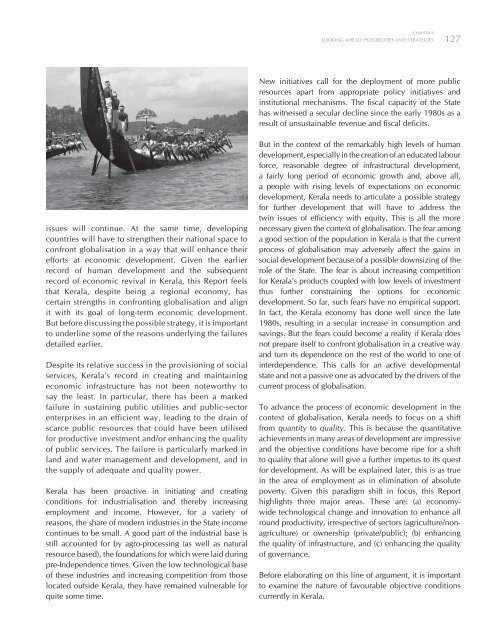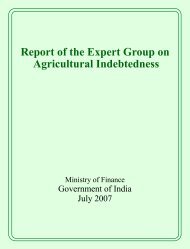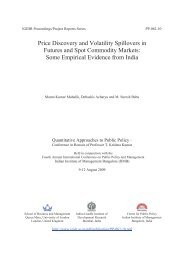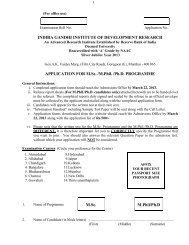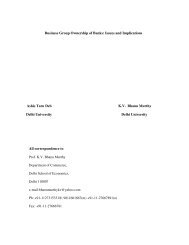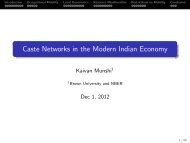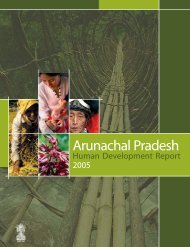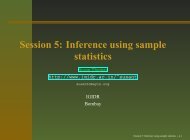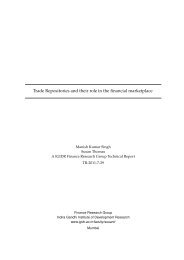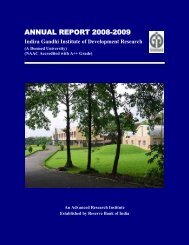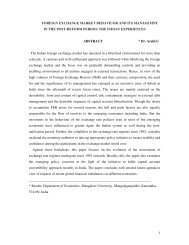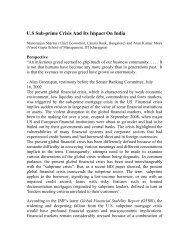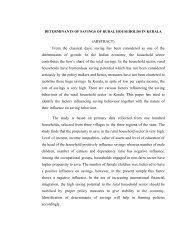Kerala 2005 - of Planning Commission
Kerala 2005 - of Planning Commission
Kerala 2005 - of Planning Commission
Create successful ePaper yourself
Turn your PDF publications into a flip-book with our unique Google optimized e-Paper software.
CHAPTER 8<br />
LOOKING AHEAD: POSSIBILITIES AND STRATEGIES<br />
127<br />
New initiatives call for the deployment <strong>of</strong> more public<br />
resources apart from appropriate policy initiatives and<br />
institutional mechanisms. The fiscal capacity <strong>of</strong> the State<br />
has witnessed a secular decline since the early 1980s as a<br />
result <strong>of</strong> unsustainable revenue and fiscal deficits.<br />
issues will continue. At the same time, developing<br />
countries will have to strengthen their national space to<br />
confront globalisation in a way that will enhance their<br />
efforts at economic development. Given the earlier<br />
record <strong>of</strong> human development and the subsequent<br />
record <strong>of</strong> economic revival in <strong>Kerala</strong>, this Report feels<br />
that <strong>Kerala</strong>, despite being a regional economy, has<br />
certain strengths in confronting globalisation and align<br />
it with its goal <strong>of</strong> long-term economic development.<br />
But before discussing the possible strategy, it is important<br />
to underline some <strong>of</strong> the reasons underlying the failures<br />
detailed earlier.<br />
Despite its relative success in the provisioning <strong>of</strong> social<br />
services, <strong>Kerala</strong>’s record in creating and maintaining<br />
economic infrastructure has not been noteworthy to<br />
say the least. In particular, there has been a marked<br />
failure in sustaining public utilities and public-sector<br />
enterprises in an efficient way, leading to the drain <strong>of</strong><br />
scarce public resources that could have been utilised<br />
for productive investment and/or enhancing the quality<br />
<strong>of</strong> public services. The failure is particularly marked in<br />
land and water management and development, and in<br />
the supply <strong>of</strong> adequate and quality power.<br />
<strong>Kerala</strong> has been proactive in initiating and creating<br />
conditions for industrialisation and thereby increasing<br />
employment and income. However, for a variety <strong>of</strong><br />
reasons, the share <strong>of</strong> modern industries in the State income<br />
continues to be small. A good part <strong>of</strong> the industrial base is<br />
still accounted for by agro-processing (as well as natural<br />
resource based), the foundations for which were laid during<br />
pre-Independence times. Given the low technological base<br />
<strong>of</strong> these industries and increasing competition from those<br />
located outside <strong>Kerala</strong>, they have remained vulnerable for<br />
quite some time.<br />
But in the context <strong>of</strong> the remarkably high levels <strong>of</strong> human<br />
development, especially in the creation <strong>of</strong> an educated labour<br />
force, reasonable degree <strong>of</strong> infrastructural development,<br />
a fairly long period <strong>of</strong> economic growth and, above all,<br />
a people with rising levels <strong>of</strong> expectations on economic<br />
development, <strong>Kerala</strong> needs to articulate a possible strategy<br />
for further development that will have to address the<br />
twin issues <strong>of</strong> efficiency with equity. This is all the more<br />
necessary given the context <strong>of</strong> globalisation. The fear among<br />
a good section <strong>of</strong> the population in <strong>Kerala</strong> is that the current<br />
process <strong>of</strong> globalisation may adversely affect the gains in<br />
social development because <strong>of</strong> a possible downsizing <strong>of</strong> the<br />
role <strong>of</strong> the State. The fear is about increasing competition<br />
for <strong>Kerala</strong>’s products coupled with low levels <strong>of</strong> investment<br />
thus further constraining the options for economic<br />
development. So far, such fears have no empirical support.<br />
In fact, the <strong>Kerala</strong> economy has done well since the late<br />
1980s, resulting in a secular increase in consumption and<br />
savings. But the fears could become a reality if <strong>Kerala</strong> does<br />
not prepare itself to confront globalisation in a creative way<br />
and turn its dependence on the rest <strong>of</strong> the world to one <strong>of</strong><br />
interdependence. This calls for an active developmental<br />
state and not a passive one as advocated by the drivers <strong>of</strong> the<br />
current process <strong>of</strong> globalisation.<br />
To advance the process <strong>of</strong> economic development in the<br />
context <strong>of</strong> globalisation, <strong>Kerala</strong> needs to focus on a shift<br />
from quantity to quality. This is because the quantitative<br />
achievements in many areas <strong>of</strong> development are impressive<br />
and the objective conditions have become ripe for a shift<br />
to quality that alone will give a further impetus to its quest<br />
for development. As will be explained later, this is as true<br />
in the area <strong>of</strong> employment as in elimination <strong>of</strong> absolute<br />
poverty. Given this paradigm shift in focus, this Report<br />
highlights three major areas. These are: (a) economywide<br />
technological change and innovation to enhance all<br />
round productivity, irrespective <strong>of</strong> sectors (agriculture/nonagriculture)<br />
or ownership (private/public); (b) enhancing<br />
the quality <strong>of</strong> infrastructure, and (c) enhancing the quality<br />
<strong>of</strong> governance.<br />
Before elaborating on this line <strong>of</strong> argument, it is important<br />
to examine the nature <strong>of</strong> favourable objective conditions<br />
currently in <strong>Kerala</strong>.


